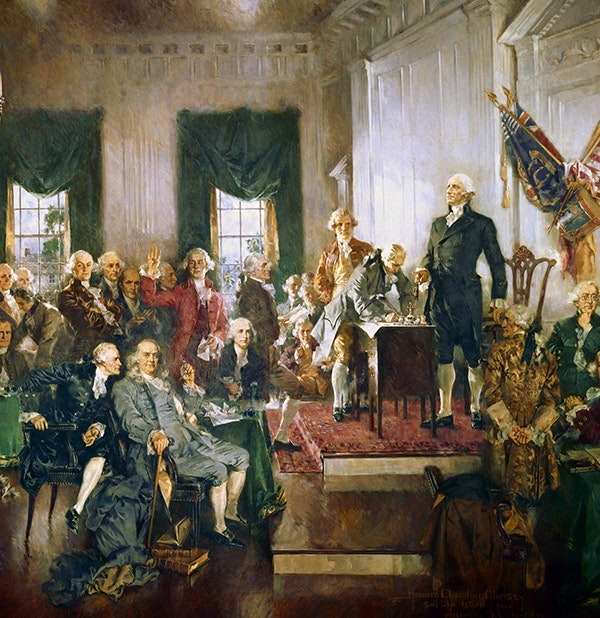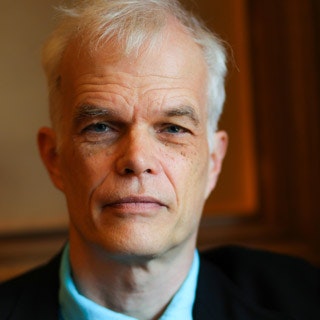What Lincoln Learned from the Founders – And What Leaders Today Can Learn from Them
Using core principles and values as a guide carries a relevance across generations and through any challenge.
 Howard Chandler Christy's Scene at the Signing of the Constitution
Howard Chandler Christy's Scene at the Signing of the Constitution
Abraham Lincoln (b. 1809) grew up as the last of the Founding Fathers aged and died: Thomas Jefferson still had one month left in the White House when Lincoln was born, and the ex-president died when the future one was 17. All his life Lincoln was mindful of the founders’ example. What particular lessons did he take from them—lessons we might still take today?
Lincoln drew on different founders at different times in his life. The great issue of Lincoln’s maturity was the status of slavery in America—was it an evil that ought to end, or a matter of indifference, even a good thing, that might last forever? Lincoln argued that the founders believed slavery was unjust—and to prove it he cited the Declaration of Independence, and its author Thomas Jefferson. The Declaration was the nation’s founding document, unanimously endorsed by the Continental Congress. Every state had approved it, including its statement of the self-evident truth of human equality. Lincoln invoked Jefferson and the Declaration repeatedly. “The principles of Jefferson,” he wrote for a commemoration of Jefferson’s birthday in 1859, “are the definitions and axioms of free society. Jefferson had “introduce[d] into a merely revolutionary document, an abstract truth, applicable to all men and all times,” which would be “a rebuke and a stumbling block to…tyranny and oppression.” This was a lesson in the importance and enduring relevance of principle.
Jefferson had “introduce[d] into a merely revolutionary document, an abstract truth, applicable to all men and all times,” which would be “a rebuke and a stumbling block to…tyranny and oppression.” This was a lesson in the importance and enduring relevance of principle.

At the same time, Lincoln knew that the founders were realists. They accepted slavery’s existence—many of them, including Jefferson, owned slaves. But Lincoln argued that they also took concrete steps to contain slavery—forbidding it in the Northwest Territory, ending the slave trade in 1808—in the hope that it would wither away. As Lincoln put it in his 1858 debates with Stephen Douglas, they “stop[ped] its spread in one direction and cut off its source in another.” If the end were guaranteed, Lincoln was willing to wait for it. This was a lesson in patient determination.
The influence of Thomas Paine
One of the founders who most influenced Lincoln when he was a young man was the revolutionary journalist Thomas Paine. Paine had earned an all-American reputation by chronicling the Revolutionary War (“These are the times that try men’s souls”). But he had earned notoriety with his post-war polemic, The Age of Reason, which attacked organized religion. Paine called all existing religions “human inventions set up to terrify and enslave mankind.” Twenty-something Lincoln, living away from his pious family for the first time, swatted Paine up.
Paine showed him how to use humor to make serious points. Paine could take a dogma like the Virgin Birth, buttressed by centuries of theological justification, and mock it by taking it literally: if a modern girl said “that she was gotten with child by a ghost, and that an angel told her so, would she be believed?” Lincoln, inspired by Paine, would use sly bluntness to defuse partisan attacks: when opponents accused him of wanting inter-racial sex—a common jibe of slavery’s supporters—Lincoln would answer that, just because he did not want a black woman for a slave did not mean he wanted her for a wife. “I can just leave her alone.” He made a joke—and a serious point, because leaving a black woman alone meant leaving her free.
Lincoln’s religious beliefs would change profoundly, as the youthful skeptic became a passionate Bible reader. Whether Lincoln became an orthodox Christian is a contested point among Lincoln biographers. What is not debatable is that Lincoln turned to the Bible, especially as the Civil War ground on, to shape his own prose and to draw sustenance during the nation’s fiery trial.
What is not debatable is that Lincoln turned to the Bible, especially as the Civil War ground on, to shape his own prose and to draw sustenance during the nation’s fiery trial.
Ironically Paine showed the way here too. Paine took the Bible seriously—seriously enough to attack it. Lincoln’s youthful bout of skepticism ensured that he would approach the Bible as a mature man with respect, and clear eyes.

George Washington and the struggle at Trenton
But the first, and perhaps most important founder in Lincoln’s life was George Washington, whom Lincoln met in what we would now call a young adult classic, The Life of General George Washington by Parson Weems. Weems published his biography in 1800, the year after Washington died, and Lincoln discovered it “in the earliest days of my being able to read.”
We remember Weems now for his tales of Washington as a good boy: when young George accidentally chops a prize cherry tree in his father’s orchard, he confesses the deed and is praised for his honesty. But what impressed Lincoln was Weems’s account of Washington as a great man—specifically, his heroism at the Battle of Trenton, at the end of 1776. Washington and his men had been on the run, chased out of New York City and across New Jersey, for four months. But at Trenton he turned on his pursuers, won a surprise attack at dawn and saved the patriot cause.
Lincoln recalled the battle on his way from Illinois to his first inauguration in 1861. The country was already falling apart—six states had seceded shortly after Lincoln won the presidential election in November, and five more would follow. In a speech in Trenton, the capital of New Jersey, Lincoln spoke about the effect that Parson Weems’s book had made on him. Nothing had “fixed [itself] upon my imagination so deeply as the struggle here at Trenton.”
What had moved Lincoln so? “I recollect thinking then, boy even though I was, that there must have been something more than common that those men struggled for…something even more than national independence…something that held out a great promise to all the people of the world to all time to come.” Jefferson had stated a principle in the Declaration, Washington had fought for it.
“I recollect thinking then, boy even though I was, that there must have been something more than common that those men struggled for…something even more than national independence…something that held out a great promise to all the people of the world to all time to come.” Jefferson had stated a principle in the Declaration, Washington had fought for it.

Now Lincoln, the president-elect, would be called on to fight for it again. What he read as a boy inspired him as a man.
Principle and patience are important, and a leader has to show both humor and seriousness. But there are times when you must fight. Lincoln learned his lesson well.

